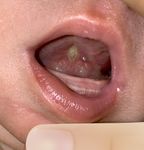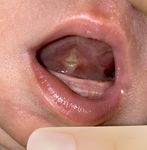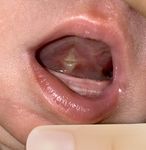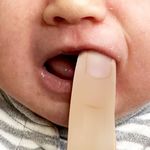POST-OP FRENECTOMY HOME CARE GUIDE - Dr. Chelsea Pinto
←
→
Page content transcription
If your browser does not render page correctly, please read the page content below
WHAT YOU MAY EXPECT HEALING REMEDIES
AFTER THE PROCEDURE: HOMEOPATHIC REMEDIES
Please note the healing timeline may vary among children. Homeopathy is a system of holistic medicine that stimu-
lates the body’s own healing abilities and can be used along-
DAY 1-3 WEEK 1 WEEKS 2-3 side conventional medication or as an alternative option.
Homeopathic remedies use highly diluted natural substances
from plant extracts and minerals, making them great options
Baby may be Baby is adjusting Follow wound for young children (who often respond quickly to treatment).
sore, expect to new mobility care timeline as
fussiness and suck/feeding advised by Boiron Camilia: Oral Liquid Doses
(especially at the patterns Dr. Pinto; healing • Children 1 month and up: Administer one entire liquid
5-hour mark patch shrinking
dose; repeat every 15 minutes for 2 more doses.
post-procedure)
This repetition of 3 doses can be repeated 3 times a
day for a total of 9 doses each day.
Expect inconsis- May observe Baby continues
Hyland’s Naturals Baby Oral Pain Relief:
tency in baby’s minor bleeding building strength
feeding patterns; from healing and coordina- Dissolvable oral tablets
have back up site after tion; implement
feeding plan and performing oral exercises as • Children under 6 months: Dissolve 2 tablets on tongue
comfort mea- wound care recommended every hour up to 4 hours as needed. If symptoms persist,
sures prepared stretching 2 tablets every 4 hours during the night until relieved.
o Note: For infants, consider dissolving tablet with a few drops of
breastmilk/water on a plate to create a paste you can wipe inside of
the mouth
Begin wound Improvements More consistent
care stretching may be noted improvements in • Children 6 months to under 3 years: At onset of
the evening of but feedings like- feeding typically
procedure or ly inconsistent observed
symptoms, dissolve 3 tablets on tongue every hour up
next morning to 4 hours as needed. If symptoms persist, 3 tablets every
4 hours during the night until relieved.
Consider Soreness Bodywork/oral
homeopathic tapers off motor therapy/ INFANT ACETAMINOPHEN/TYLENOL
remedies as feeding support (3-6 MONTHS) OR CHILDREN’S IBUPROFEN/
needed as needed
ADVIL/MOTRIN (OVER 6 MONTHS):
Please use caution & consult with pediatrician.
White healing Recommend Healing patch
patch forms day scheduling post- starts to disap-
2-3, this is op lactation/ pear; a “new”
nature’s band-aid feeding support longer, more FUSSY BABY POST-FRENECTOMY? TRY THESE
session or flexible frenulum SOOTHING TOOLS.
additional body- begins to take
work/therapy as shape over Baby Wearing or Skin-to-Skin
needed coming weeks Research shows close contact with your little one helps
baby regulate physical and emotional responses. Try using
a hands-free baby carrier/wrap to keep your baby close and
to lessen feelings of stress or discomfort should they arise.
Bouncing & Rocking
These gentle movements aid to soothe and comfort.
If you are having a hard time calming your baby or getting
him/her to sleep, try holding your child while sitting on a
large exercise ball and bouncing for a few minutes. One of
Dr. Pinto’s favorite tricks!
Fresh Air
Get outside and breathe it in. This should help calm your
baby’s emotional state (as well as your own). Try holding,
bouncing, baby wearing or a stroller ride.
Cold Yummies
Breast-milk ice chips/pops, homemade frozen yogurt drops,
and/or cold teething toys (if age appropriate) may help with
oral discomfort.POST-FRENECTOMY HEALING SITES
The incision site will form a wet, soft scab after the first day (resembling a diamond shape under the tongue).
This is nature’s “band-aid” and while typically white in color, in some cases it is yellow. The scab usually peaks in
size by day five and then starts to shrink over the following weeks. The size of the healing site may vary among
children and is based upon individual frenulum anatomy.
Lingual Healing Site (Tongue) Labial Healing Site (Lip)
POST-FRENECTOMY WOUND CARE
Dr. Pinto recommends gentle, manual stretching of the treated area(s) 3x daily to help support tissue
flexibility and optimal healing patterns. Use adequate lighting to visualize the area(s) as needed. You may
use gloves or clean hands.
TONGUE: LIP/CHEEK:
PUSH, SCOOP N’ STRETCH FINGER SWEEP
PUSH... SCOOP... STRETCH... Place your index finger
inside your baby’s cheek area
directly into the bottom corner to lift the tongue the tongue up for a few making sure your finger is all
of the site using one index up towards the seconds and ensure the the way up in the “pocket.”
finger; use the other hand to roof of the mouth. diamond elongates vertically; Sweep your finger across the
gently press down on child’s your index finger should now healing site 1-2x; this should
chin to open and stabilize rest at the top of/above the only take a few seconds.
the mouth. diamond-shaped incision.WOUND CARE TIPS
Standing Stretch
• Laying baby down to perform wound care typically provides you with the best view of the
healing site(s).
• If you are finding this challenging and/or your child is getting upset, try Dr. Pinto’s
“standing stretch” technique. Hold your baby in one arm while using your index
finger on your free hand to access sites – bounce, walk, and shush as needed to
quickly complete the care.
o Tip: Gain site visibility by standing in front of a mounted wall mirror.
Toddler Recommendations
• If laying child down is not working for your family, you may find it easier to sit
child on your lap or the couch to complete wound care.
• Consider using a chewy oral motor/teething toy or a homemade popsicle to
achieve better compliance and access. Rely on take-home bite block as needed.
o Tip: Optimize child’s movement during healing with mirroring exercises, a variety of
foods and textures (if appropriate) and by working closely with your oral
motor specialist when recommended.
NORMAL POST-TREATMENT OCCURRENCES
Due to the initial soreness and changes in child’s latch/oral mechanics, feedings may be inconsistent the first week. It
is critical to have support from a feeding specialist for guidance. Snuggle and love on your baby as much as possible
to increase oxytocin levels and to help lower pain sensitivity.
Increased Sleeping
May be due to tiredness/discomfort or that your child is feeding more efficiently and, in turn, more satisfied post-feeds.
Increased Spitting Up or Salivary Production
Some babies may take in more milk in a shorter time frame post-treatment, causing a temporary increase in reflux
symptoms. As your child adjusts to increased oral mobility, you may observe increased salivary production during the
first week post-procedure.
Minor Bleeding from Site(s)
A few drops of blood in the saliva may occasionally occur after stretching the site(s).
Changes in Symptoms and Feeding Habits May Take Time
Expect an adjustment period. Some babies may require more support than others to help address tongue-tie
related compensatory patterns and the adjustment to new oral mobility. Please take advantage of the professional referrals
Dr. Pinto may provide for your child.
WE’RE HERE FOR YOU!
Although rare, please do not hesitate to call DR. CHELSEA PINTO, DDS
the office if you experience the following: 20301 Ventura Blvd. #110
• Fever greater than 101.5 F
Woodland Hills, CA 91364
• Uncontrolled bleeding
• Refusal to feed (bottle and/or breast) for Phone: 310-272-5671
over 8 hoursYou can also read



























































